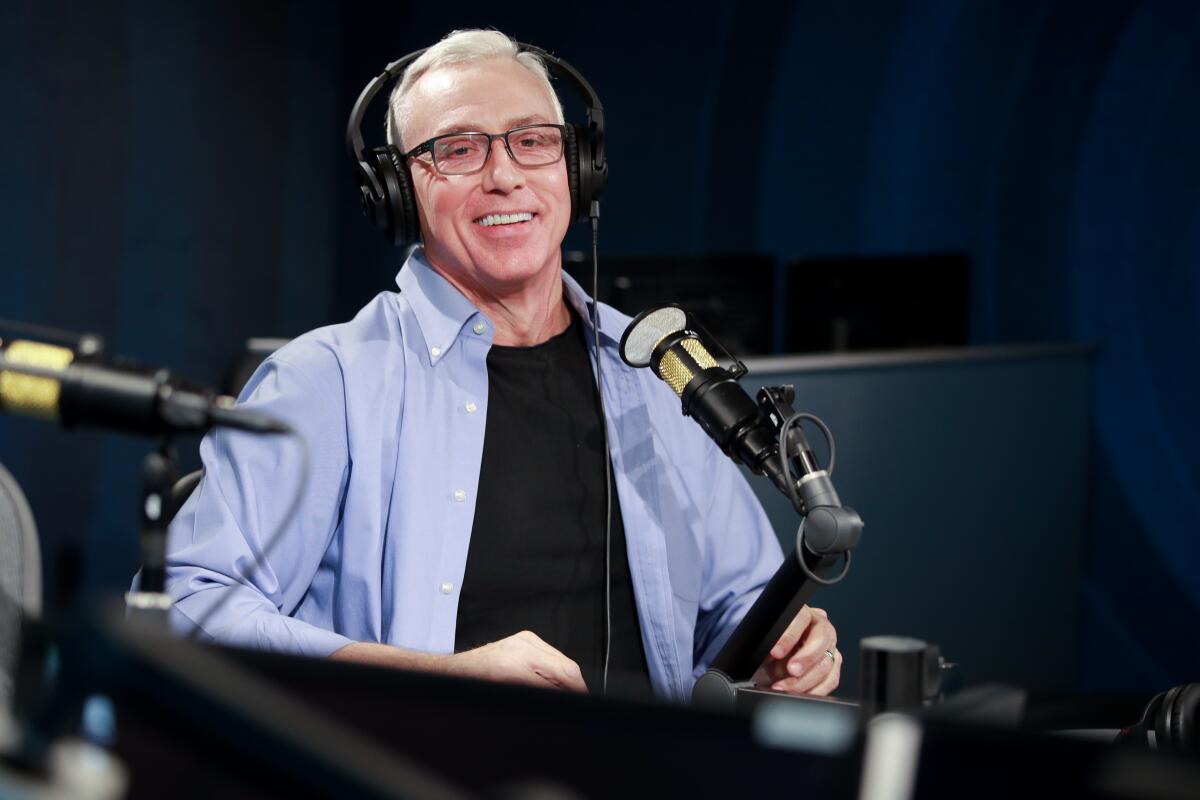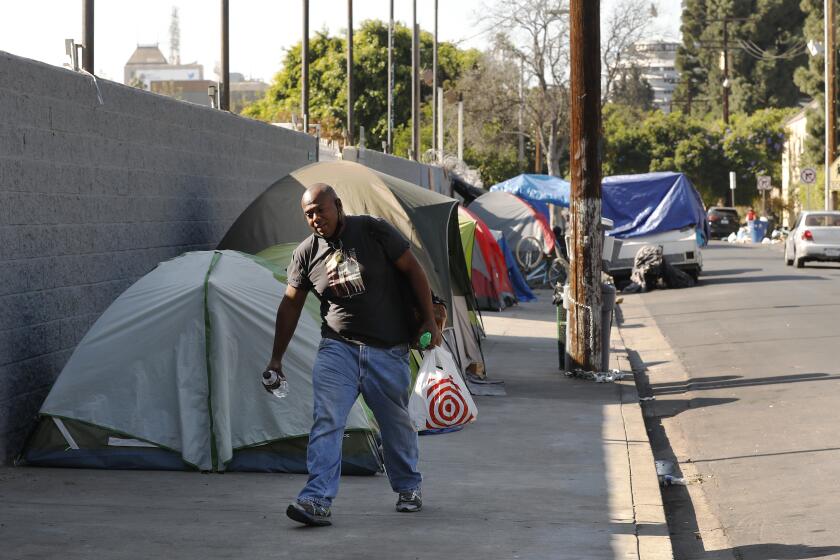Dr. Drew eyed for homeless commission, angering advocates who wonder: Is this a joke?

- Share via
A Los Angeles County supervisor has recommended a celebrity doctor who has railed against California’s mishandling of the homelessness crisis to a local commission, a move that shocked some advocates who, when they heard the news, thought it was a joke.
Dr. David Drew Pinsky, more commonly known as Dr. Drew, was recommended by 5th District Supervisor Kathryn Barger, the only Republican on the five-member board, for the Los Angeles Homeless Services Authority, a 10-member commission appointed by city and county elected officials.
Barger said she nominated Pinsky because he’ll bring a “fresh perspective” to the commission with his vast medical experience and passion for mental health.
But critics pounced, saying Pinsky promotes ill-formed and harmful views, including an enforcement-focused approach to homelessness like that seen at Echo Park Lake.
Pinsky made headlines last April after making a series of remarks over a two-month period that were skeptical of COVID-19, comparing the novel coronavirus to the flu and calling the pandemic a “press-induced panic.” He eventually apologized.
The remarks were part of a larger trend with Pinsky, said Mark Horvath, founder of nonprofit Invisible People.
“Even on a surface level, why are you [appointing] a celebrity doctor — and I use the term ‘doctor’ loosely — that has recent activity with being a COVID denier?” said Horvath, who launched his homeless advocacy group in 2008.
After the countywide homeless count was canceled, Hollywood activists conducted their own. The surprise: Street homelessness was down 12% in Hollywood.
Although the commission has authority to make budgetary, funding, planning and programming policy, it’s unclear how much power Pinsky would have as an individual. The commission selects the LAHSA executive director, but it doesn’t make individual staffing decisions beyond that.
Pinsky’s appointment is on the agenda for Tuesday’s Board of Supervisors meeting. Generally, the board unanimously approves appointments to local boards and commissions at the beginning of its meeting, as part of its consent agenda. They are rarely, if ever, seen as controversial.
Pinsky, 62, said he was surprised by the uproar about appointing a physician who wants to donate his time and has worked in the mental health and addiction field for decades.
Pinsky disputes the idea that homelessness is caused primarily by a lack of housing. He said the primary drivers of L.A. County’s homelessness crisis are rooted in the lack of services for the treatment of mental illness and drug addiction. Many homeless people with serious mental illnesses, he said, are unable to recognize their illness and its effect on their lives.
“Something is dreadfully wrong, and people are dying,” said Pinsky, who lives in Pasadena. “That’s my biggest concern, and when I go out and talk to homeless people, I encounter my patients, almost exclusively. That doesn’t mean that’s all that’s out there.”
In speeches and on his podcast, Pinsky has railed against California’s involuntary commitment law for restricting commitments to only the most seriously ill people.
He has also discussed the need to enforce drug laws to get homeless people with substance abuse disorders into treatment. Those who are addicted to drugs need leverage — the risk of a criminal conviction — hanging over them to motivate them into treatment, he has said.
In an interview, Pinsky said he believes in housing people but is frustrated by the public perception that giving someone housing alone will end the crisis.
“I don’t think most people in the public understand what is really needed and the depths of services that are required” to solve homelessness, he said.
When the city swiftly fenced off Echo Park and prodded people out of a sprawling camp that had taken root along its scenic lake, it was an extraordinary move in a city full of homeless encampments.
Homeless advocate Mike Dickerson, co-founder of Ktown For All, said Pinsky perpetuates a dangerous myth that the majority of homeless people don’t need housing as much as they need mental health treatment. People who can’t pay their rent because they lost a job or suffered a serious personal loss aren’t homeless because of a mental illness, he said.
Dickerson said Pinsky is hostile to research that runs counter to his claims.
“Elevating someone to that position is kind of inherently saying ‘This is someone who is qualified and has expertise on the issue of homelessness,’” Dickerson said. “I don’t think that’s an accurate portrayal of Dr. Drew and his background.”
Horvath, the Invisible People founder, said Pinsky regularly misquotes and exaggerates the number of people who are homeless and have a serious mental illness or substance use disorder.
“The majority of homeless people are sober. The majority are kids under 16 years old. I mean, couldn’t [Barger] have picked Kim Kardashian?” Horvath said.
When Horvath tweeted about Barger’s recommendation of Pinsky on social media, many thought he was joking, he said.
In a social media support group for people experiencing homelessness, many expressed dismay.
“They don’t like Dr. Drew — I’ll give you the censored version,” he said of the comments.
Times staff writer Benjamin Oreskes contributed to this report.
More to Read
Sign up for Essential California
The most important California stories and recommendations in your inbox every morning.
You may occasionally receive promotional content from the Los Angeles Times.
















